Israeli Scene
Life + Style
Feature: Back to the Garden
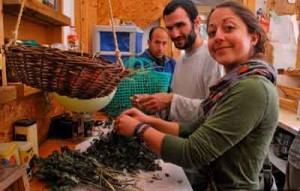
Twenty-one-year-old Alyssa Tanz of Toronto is busy shoveling aged manure from her wheelbarrow onto the ground, forming a circle of natural fertilizer around the base of a fruit tree at the Hava ve-Adam organic farm near Modi’in, in central Israel. She is spending a five-month internship with Hava ve-Adam’s Eco-Israel project, now a program of MASA, a government-subsidized initiative to encourage Israel experiences for diaspora Jewish youth.
She and 15 other students split their days between Jewish studies, Hebrew lessons and experiential learning about permaculture, organic gardening and sustainable building and design. The goal is to learn how Jewish values might better inform their relationship with the earth in general and the Land of Israel in particular.
“What do our Hebrew teachings offer [on] how we participate in the ecosystem?” asks Yigal Deutscher, 29, founder of the two-year-old project and its permaculture instructor. “The ancient Hebrew message is very powerful. It teaches that God is one, everything is connected. The way we relate to agriculture defines who we are as a society.”
The students move into yurt-like domes—circular, portable tents—and cook outside in wood-burning mud ovens. The farm is not hooked up to the national water or power grid; they catch rainwater in barrels, use compost toilets, filter their wastewater for irrigation; and power their utilities with solar panels, using a generator as backup. They raise chickens for eggs, sheep for wool (for use in art projects) and donkeys for manure.
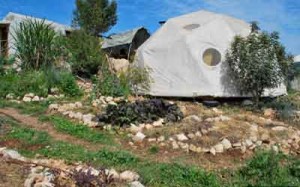
The students and staff at Hava ve-Adam (www.havaveadam.org/eng) are part of a small but growing community of younger Israelis who are trying to raise public awareness of and interest in sustainable farming and food production. An offshoot of Israel’s environmental movement, the sustainable food movement focuses on human needs as well as those of the land, but looks to satisfy those needs in a way that does not deplete the earth’s natural resources.
The spartan living conditions and agricultural work at Hava ve-Adam hearken back to the early pioneers; but today’s student farmers have more far-reaching goals. It’s not enough, they say, to make the desert bloom; they want to make it bloom right, by planting native crops, eschewing pesticides and making sure they leave the land in better shape than when they arrived.
“We built this country with almost blind use of its natural resources,” Deutscher says, speaking about Israel’s early years of draining the swamps and planting non-native orange groves and cotton fields to feed, clothe and house a fast-growing population. That may have been a priority at the time, he adds, but many of today’s young Jews want a different relationship to the land and its resources. “The drive to connect to the land is still there,” he says. “But it’s not so much ‘how do I connect to the land for security’ as ‘how do I connect to it spiritually.’”
Sustainability is all the rage today in North America, from the proliferation of farmers’ markets to the growing demand for locally sourced, pasture-raised meat and poultry. But like many trends, this one, too, has been slow in reaching Israel.
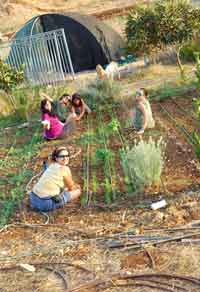
Photo courtesy of Hava ve-Adam
“It’s of interest to a very small group of people,” admits Chaim Feldman, 35, who works with young Israelis spending their shenat sherut (year of optional pre-Army national service) at Hava ve-Adam.
Spurred on in many cases by North American olim, including a number of former Young Judaeans, sustainable agriculture is still marginal in a society more caught up in the need to protect its borders than ensure the longevity of its soil and water supply.
“Most of Israel is dependent on the commercial food industry,” Feldman says. “Seasonal eating has disappeared. The Israeli diet is cucumbers and tomatoes, year-round, even when not in season; they’re grown in greenhouses.”
Concerns about sustainable farming are linked, advocates say, to issues of health. And it is not just a bunch of young food advocates raising these issues. The Israeli media is focusing attention on the country’s growing obesity problem, unheard of a generation ago. A 2009 report by the Knesset Research Center showed that 10 percent of Israeli children and teenagers are obese. Major research studies at Ben-Gurion University of the Negev, among others, are looking at the health impact of the Russian and Ethiopian aliyas, which brought more than a million new immigrants to the country, along with their diets heavy in meat, bread and sugar.
Israel’s economic success has contributed to its health problems. Globalization and prosperity have produced an influx of American-made processed foods, from cereals to soda. Supermarkets with their frozen food aisles and prepackaged meats continue to replace the makolet, or corner grocery store, where Israelis used to pick up fresh fruit and vegetables, nuts, seeds and other bulk food items.
Awareness of the long-term importance of sustainable farming and its impact on health as well as the land is growing. “It’s not in the Israeli consciousness yet,” says David Lehrer, executive director of the Arava Institute for Environmental Studies (www.arava.org) and a former Young Judaean who made aliya to Kibbutz Ketura in the 1970s. However, a lot of the apparent lack of awareness is a matter of language.
“Israelis don’t use the term ‘sustainable,’” notes Jeremy Benstein, deputy director of The Heschel Center for Environmental Learning and Leadership (https://heschel.org.il/eng) and another former Young Judaean.
That is true even when talking about practices that fit the rubric. For example, organic agriculture has been practiced in Israel since the 1960s, when Italian immigrant Mario Levy pioneered it at Kibbutz Sde Eliyahu in the Beit Shean Valley. Organic restaurants and food products such as locally produced goat cheese are popular among the well-heeled denizens of north Tel Aviv and environmental activists alike.
But organic agriculture is not always sustainable—it is possible to grow organic oranges in the desert, where they don’t belong, by pumping in freshwater, a nonsustainable practice.
More relevant is drip irrigation, an Israeli invention that permits sustainable farming with limited water. Israeli scientists have long been involved in desert agriculture research, finding new strains of drought-resistant fruits and vegetables.
Ze’ev Wiesman of Ben-Gurion University’s Department of Biotechnology Engineering has led more than 15 years of research into growing crops using the Negev’s underground reservoirs of saline water.
In 1994, his team launched a 12-year study to show that olives could be grown in the Negev using only brackish water, delivered directly to the tree roots by drip irrigation. In 2006, the results were in: The trees grew better than those irrigated with freshwater, and the olives could be brought to market earlier than European olives, giving Israeli farmers an economic advantage. And because of the harsh desert conditions, the oil produced by those olives had more antioxidants, another selling point on the global market.
Wiesman’s team is now researching pomegranates. “I see this as sustainable,” Wiesman says. “We are using available resources—saline water, the sun and our intelligent people, which are our most important natural resource.”
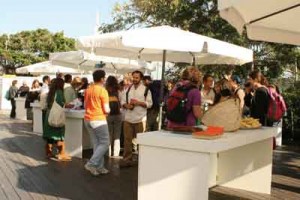
In November 2009, Israel held its first sustainable food conference, Food for Thought, at the north Tel Aviv port. More than 500 people attended the one-day event, cosponsored by the Heschel center and the Arava institute. Israel’s minister of agriculture, Shalom Simhon, addressed the crowd, and Ruth Ozeki, author of My Year of Meats(Penguin), was the keynote speaker.
Lehrer, a conference coorganizer, notes that the event was inspired by a similar conference held every December in the United States by Hazon (www.hazon.org), a New York-based nonprofit that is at the epicenter of the sustainable Jewish food movement in North America. “We adjusted it to the Israeli reality,” Lehrer says.
One popular session dealt with the changing Israeli breakfast. “I arrived in 1973, and I remember the cottage cheese, fresh fruit and juices, the vegetables,” Lehrer says. “That’s not what the average Israeli eats at home today.” Expensive, sugary cereals and yogurts, often imported, are more likely choices, he says. “We’ve lost the more sustainable version based on local food production.”
The conference focused on how food policies affect Israeli society: How is water subsidized, and for whom? Should organic agriculture receive special subsidies? How should land and water resources be distributed?
Most of Israel’s food is still grown using conventional methods, including heavy use of pesticides and herbicides instead of the nonchemical methods of pest control favored by sustainable farming advocates. The industry is dependent on cheap foreign labor, a practice discouraged by sustainability activists. A lot of the country’s food is imported, Lehrer notes—wheat from Europe, meat from South America.
|“So the carbon footprint of the Israeli diet is quite large,” he says, referring to the amount of fuel used in transporting food to its final destination. “There is a growing but still small organic market…. It’s nothing like Whole Foods, but a few supermarkets are trying to go in that direction.”
One of the major challenges facing the sustainable organic movement in Israel, as in North America, is economic: Organic food is usually more expensive than its conventionally produced counterpart, making it inaccessible to lower-income Israelis.
The country’s few organic food co-ops are trying to change that. Community Supported Agriculture projects, where a group of people “pre-buys” a season’s worth of produce from a local farmer, haven’t caught on in Israel, with a few exceptions. The locavore notion of buying one’s produce and fresh dairy products from within a 150-mile radius is less relevant in a country whose entire area fits within that geographic limitation.
Instead, many Israeli food activists are banding together to buy organic fruits and vegetables locally at reduced cost. Some of these co-ops have political overtones, with groups of Israelis pooling their money to buy organic produce from Palestinian farmers across the green line—a sort of vegetables-for-peace endeavor.
One such co-op exists at Tzur Hadassah, just outside Jerusalem. A group of environmentally conscious residents had been buying expensive organic produce commercially for years.
Five years ago, they realized Palestinian farmers in Wadi Fukin, a West Bank village whose land abuts their own, were growing pesticide-free fruits and vegetables and had no place to sell them; increased security measures had cut them off from their main market in Bethlehem.
“It was like a gift,” says Tamar Gridinger, one of the co-op’s organizers. “Both sides could gain from it: We could buy the fruits and vegetables we wanted, and they could make money.”
Two dozen Tzur Hadassah families participate in the project, which grew out of Good Water Neighbors, a Palestinian-Israeli-Jordanian water conservation program run by Friends of the Earth Middle East (www.foeme.org). Every week, the Israelis drive over the border to pick up fresh eggplant, tomatoes, cucumbers, parsley, cauliflower and okra—whatever is in season. They each pay the farmers in cash, about $13.
“For me, it was a good opportunity to have a good relationship with my neighbors,” says Gridinger, who says she had never met any of the villagers before the co-op started.
And then there are community gardens. The Jerusalem Municipality has taken the lead in this endeavor, sponsoring 34 community gardens on public lands throughout the city. These formerly unused plots by the sides of highways or on street corners are worked by neighborhood volunteers, who plant and harvest fruits, vegetables, nuts and herbs, while building a stronger community and educating their children in the values of urban gardening.
The first was created in the early 1990s in Jerusalem’s Baka’a neighborhood. Today, they vary from a vegetable garden in Kiryat Shmuel to a senior citizens’ herb garden in Neve Ya’akov. They are all supported by Aitek, a consortium of governmental and nongovernmental organizations.
One recent Friday afternoon, Tamir Nir was checking the vegetable plots at Achva Ba-kerem, a one-acre garden started two years ago by residents of the Beit Hakerem neighborhood. A rabbinical student at Hebrew Union College in Jerusalem, Nir is the lead educator for this project, which was formed by parents eager to teach their children about Judaism and the environment.
The garden sits on the site of a former military plant. The city sent a tractor to clear debris and allocated about $5,000 to the community center, which helps pay for teachers, composting, plants and a computer to run the irrigation system.
Every year, Nir relates, more than 400 children spend four days working in the garden. One student group built a mud oven. Third- and fourth-graders from two nearby schools planted the vegetables. About 40 families each pay from $80 to $150 to maintain the garden, which is used for food and education, Shabbat and community events. Some of the families work their own small vegetable plots.
So far, few cities outside Jerusalem have sponsored community gardens. But momentum is growing. In November 2009, Aitek held an educational forum to teach other cities how to get on board.
Beersheba has begun sponsoring some gardens, says Dena Maltinsky of Jerusalem’s Department of Social Activities, a prime mover in the city’s community gardens project, and Akko is also moving forward. “There are some gardens in Tel Aviv, and a number of other places are doing it quietly and successfully,” she says. “It’s on the table now.”
Ultimately, say the activists and researchers involved in this work, Israel will have to adopt more sustainable methods of producing food and relating to the land and its resources. It’s a matter of physical survival and personal well-being as well as moral conscience.
Change is inevitable, says Feldman, as he hoes another row in the Hava ve-Adam farm. “It will happen,” he predicts, “because of our activities, because of global awareness and, of course, because of the continued lack of resources.”
 Sue Fishkoff’s latest book is Kosher Nation: Why More and More of America’s Food Answers to a Higher Authority
Sue Fishkoff’s latest book is Kosher Nation: Why More and More of America’s Food Answers to a Higher Authority(Schocken).
Sweetening the Market
The idea of Community Supported Agriculture, where members “pre-purchase” a season’s worth of produce from a local grower, is not practiced in Israel for a variety of reasons.
But one New York-based business is using the CSA model cross-nationally to help support sustainable agriculture in Israel’s Negev Desert.
Negev Nectars (www.negevnectars.com), launched in October 2009, buys organic, sustainably produced olive oils, jams, chutneys, honeys, dried herbs and other foods from small Israeli farms in the south of the country and sells these products to CSA “shareholders” in North America.
“I believe that one day the desert can be instrumental to Israel’s future if approached with an attention to sustainability,” says Marvin Israelow, Negev Nectars founder and a supporter of desert research at Ben-Gurion University of the Negev.
Jeffrey Yoskowitz, operations and marketing director, notes that the company’s profits are all reinvested in sustainable agriculture projects in the Negev.
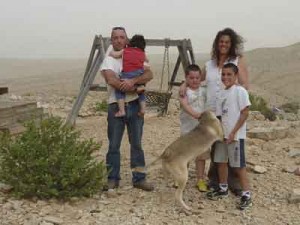
One of the six Negev Nectars participants is Orlyya Farm (www.orlyya.co.il). It is run by Yoni and Orly Sharir, a young Israeli couple who moved to a rocky cliff below Sde Boker in the south of the country seven years ago to farm the land as it might have been done in King Solomon’s time, when their property lay along a major trading route.
The Sharirs grow herbs such as salvia, geranium, rosemary, lavender and lemongrass, which cling stubbornly to the steep hillside outside their home. They dry the herbs for export to North America through Negev Nectars.
They also have 50 Argan trees—the almog trees of the Bible, Yoni Sharir explains—which they planted on the ruins of an ancient terraced field whose outlines are barely visible from the couple’s front deck. Sharir pounds the nuts into oil by hand, using a mortar and pestle; Orly sells the oil in small bottles as herbal remedy, condiment and cosmetic.
The Sharirs do not use tractors, just hand-held tools. They don’t plant in rows, just where the seeds fall. They don’t use pesticides or other chemicals. And when they built their two guest huts, where visitors can spend a weekend in the wilds of the Negev, they carried all the materials down the cliff on their backs.
“We work on desert time,” says Orly Sharir. “We do things our own way, slowly.” —S.F.










 Facebook
Facebook Instagram
Instagram Twitter
Twitter
Leave a Reply